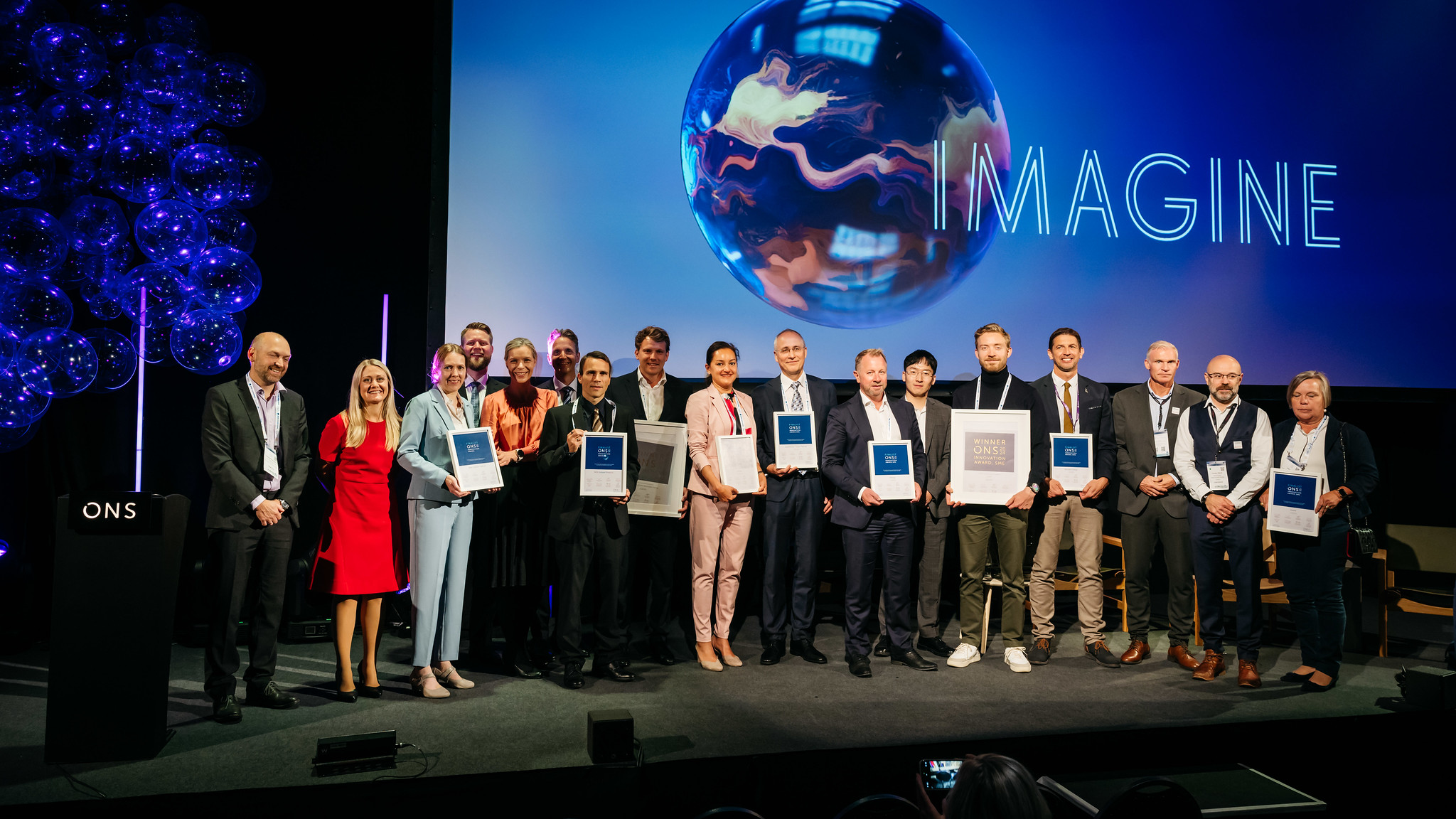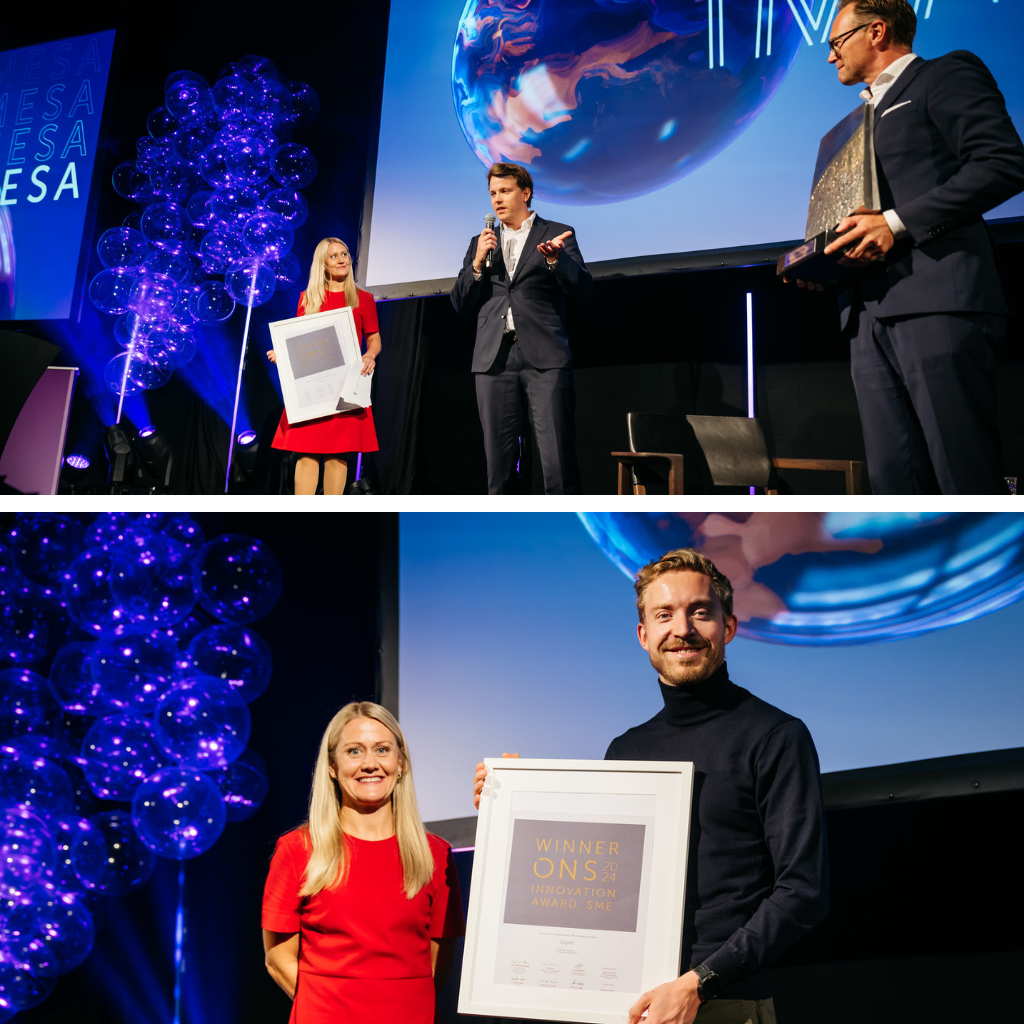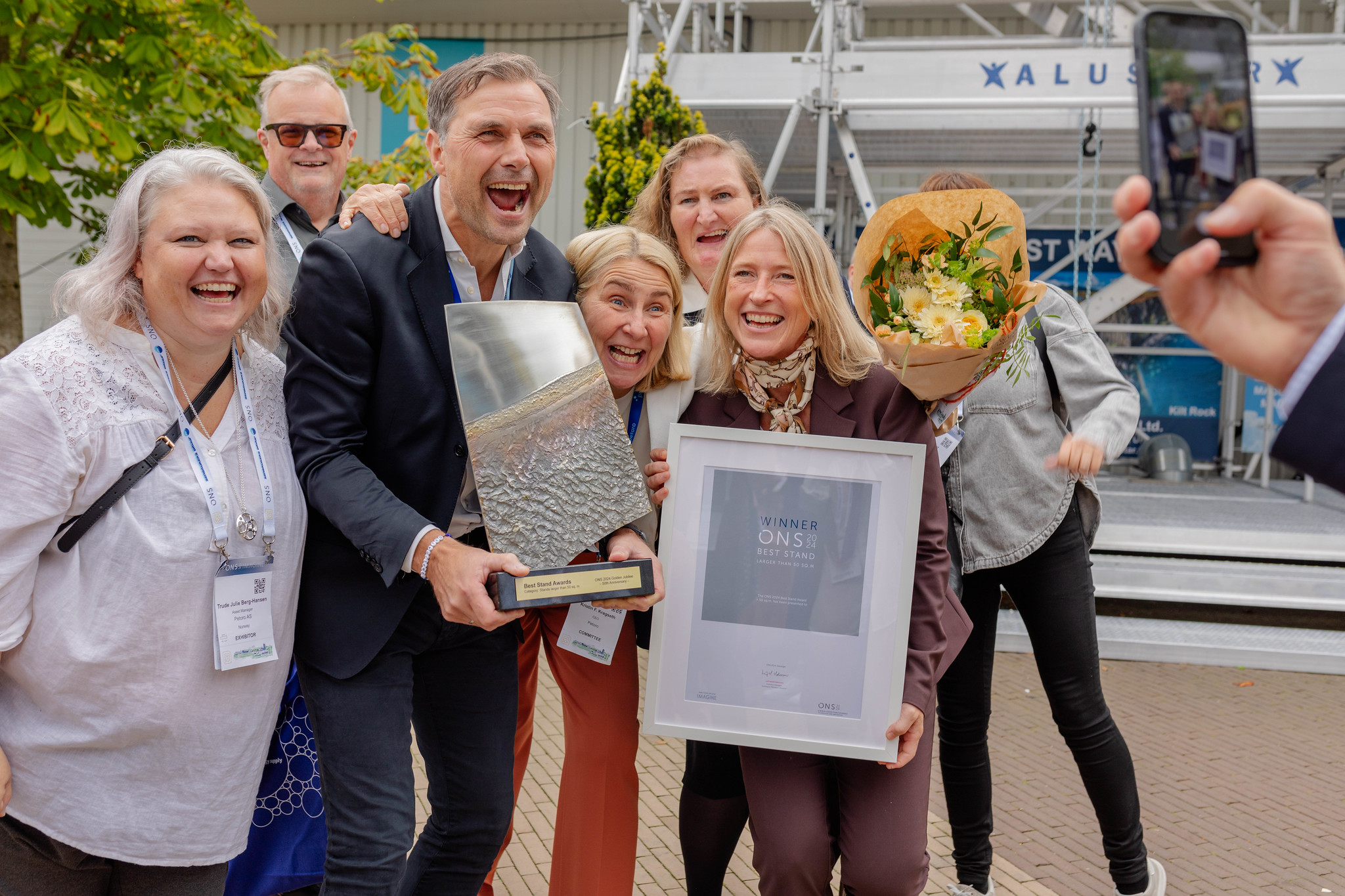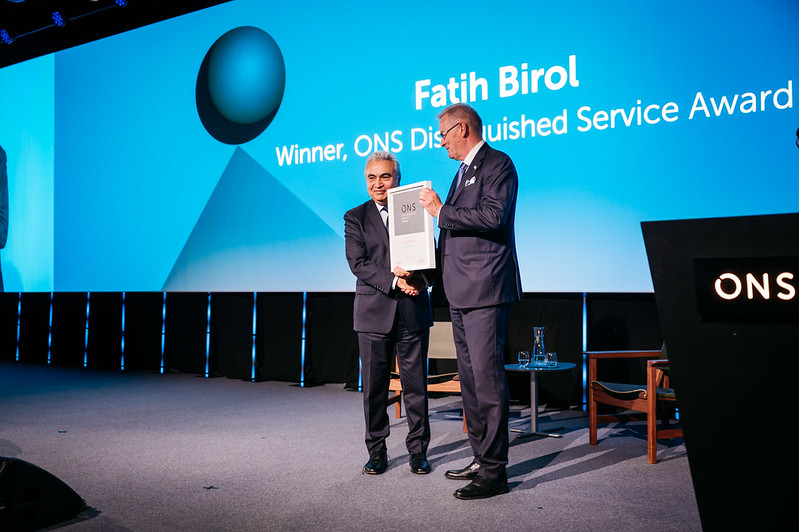Awards
The ONS Awards have a long tradition of recognising excellence across several categories, and are highly valued by the recipients.
Explore all award categories and learn how to apply below.
Tag
Awards
The ONS Awards have a long tradition of recognising excellence across several categories, and are highly valued by the recipients.
Explore all award categories and learn how to apply below.

ONS Innovation Awards
The Innovation Awards celebrate the vital role of cutting-edge technology and forward-thinking solutions. They also have a strong track record of highlighting companies and concepts that later go on to achieve significant success.
The awards feature two categories: one for large companies and one for small and medium-sized enterprises (SME). There will be one winner in each category.
Nominations must be submitted by the core team or company responsible for the innovation. Clients or collaborating partners should be included as part of the nomination.
ONS Innovation Awards
The Innovation Awards celebrate the vital role of cutting-edge technology and forward-thinking solutions. They also have a strong track record of highlighting companies and concepts that later go on to achieve significant success.
The awards feature two categories: one for large companies and one for small and medium-sized enterprises (SME). There will be one winner in each category.
Nominations must be submitted by the core team or company responsible for the innovation. Clients or collaborating partners should be included as part of the nomination.

Previous winners
2024
- RecyclableBlade by Siemens Gamesa
- Evyon's Safe and modular energy storage (SME Innovation Award)
Read more about their technologies here
2022
- Wärtsilä Norway’s “Demo2000”
- Ruden AS for “HEAT” (SME Innovation Award)
2020
- Equinor, Shell and Total’s “Northern Lights project”
- Blue Logic for “Subsea docking station” (SME Innovation Award)
2018
- Interwell for “Thermite P&A Barrier”
- Typhonix for “Typhoon Valve System” (SME Innovation Award)
2016
- Island Offshore and Centrica for Riser-less coil tubing drilling
- TechInvent for the FluidCom™ technology (SME Innovation Award)
2014
- Schlumberger – for their GeoSphere – reservoir mapping while drilling service
- Fishbones – for or its completion method for making large numbers of laterals simultaneously out of one wellbore (SME Innovation Award)
2012
- Aker Solutions & Statoil – for the Åsgard Subsea Gas Compression System
- Biota Guard – for the Biota Guard System (SME Innovation Award)
2010
- FMC Technologies – for the development of its innovative well control system, “Through Tubing Rotary Drilling” – TTRD
- Reelwell – for its research-based innovations, The Reelwell Drilling Method and Telemetry System (SME Innovation Award)
2008
- Welltec – reverse circulating bit
- Cubility – for its MudCube™ enhanced fluid cleaning system (SME Innovation Award)
2006
- Aker Kvaerner – Subsea
- Tomax (SME Innovation Award)
2004
- BP Norge AS – seismic on demand, a new way to monitor reservoirs
- Total Catcher – the tubing disappearing plug (SME Innovation Award)
2002
- AS Norske Shell – Fuel cell with zero emissions
- Easy Well Solutions (Incubator Award)
2000
Norsk Hydro ASA – H-Sep system for downhole separation of wellstream fluids
1998
ABB Offshore Technology AS – Subsis
1996
Maritime Hydraulics AS – RamRig drilling machine
1994
ETPM – SmartLeg heavy deck installation
1992
Kværner Energy AS – Booster station for subsea production
1990
Eastman Christensen – Contribution to added flexibility and accuracy in directional and horizontal drilling systems
1988
Norwegian Petroleum Consultants AS – Triss field development concept
1986
Ugland/Kongsberg Joint venture – Ukols offshore loading system
1984
Mobil Exploration and Production Norway – Subsea Atmospheric System
1982
Norwegian Contractors – Condeep
Timeline for ONS Innovation Awards 2026
- 12 January 2026 – Application portal opens
- 30 April 2026 – Deadline for applications
- August 2026 – Finalists are announced
- ONS 24 - 27 August - The awards are presented to the winners in an award ceremony
Objectives, criteria and jury assessment
Objective
The objective of the ONS Innovation Awards is to promote efforts that support energy transition at all stages of the value chain.
Background – explanatory information for those who intend to nominate
ONS offers a unique opportunity for enterprises to present new solutions to challenges in the energy transition. The ONS Innovation Awards are intended to encourage inventors, operators, entrepreneurs, suppliers and contractors to promote their innovations (technologies, products, services, processes or business models) through this high-profile contest.
- The ONS Innovation Awards address energy transition and includes all forms of energy.
- The innovation should have a place in the Net Zero future.
General Rules and Criteria for the ONS innovation awards
Innovations accepted for consideration by the jury, and thereby for publication on the ONS web site, should relate to industry requirements as outlined above, and:
- Constitute technologies, products, services, processes or business models and/or applications which are new/recently developed
- be accompanied by enough information about the company behind the innovation so that the innovation can be easily placed in the correct category
- include a description of the team behind the innovation
- be accompanied by a concise description of the innovation involved and answer clearly to all the criteria listed
- be written in English and in layman’s terms so that it is understandable to those outside of one’s own field of technology discipline/subject. Some of the jury members are specialists, others are generalists, the descriptions must therefore be easy to understand for all
- be submitted via the internet to the organiser with full documentation at any time up to application deadline
In order to achieve an effective and fair evaluation, the information requested must be submitted strictly in accordance with the specified format. Nominations that do not follow the formal requirements as outlined in the online application portal will be rejected.
Jury assessment and evaluation criteria
The jury will allocate entries to the relevant awards based on the information provided by the applicant. The following criteria will apply when evaluating the entries for both awards:
Level of innovation
- Novelty of innovation involved (in the specific enterprise, in a specific industry or sector, in a national or global market)
- Incremental, disruptive or radical innovation
Value potential
- added value by the innovation and its likely business benefit to the enterprises involved (e.g. annual sales, new business lines, expanded customer base etc.)
- whether the innovation is a niche product, has possibilities for wider adoption, is a small step or something that can revolutionize the industry.
- any other added value for the society
Market readiness
- Identified local or global market potential and customers.
- whether the innovation is fully developed, has been tested/proven or has reached first commercial sales (reference to the EU TRL (Technology Readiness Levels) scale
- plan for execution/implementation/route to market
Environmental impact
- how the innovation reduces or enables environmental impact compared to existing solutions
- how the innovation is in line with the aspirations of the Net Zero future
Confidentiality Policy
This document describes ONS and the Jury’s (the “Recipients’ ”) confidentiality policy (the “Confidentiality Policy”) towards applicants (“the Disclosing party”) in relation to information received in connection with the application for ONS Innovation awards (the “Confidential Information”). Applicants for the ONS Innovation awards are subject to acceptance of this Confidentiality Policy.
Recipients will receive Confidential Information as a part of the assessment of the applications. The jury is selected on the basis of their experience and reputation and are asked and expected to use the same care and respect for confidentiality as they do in reviewing designs, business ideas and product concepts in their other offices and positions. In particular, the Recipients shall:
- Keep the Confidential Information secret and confidential and not disclose any of it to any person other than individuals i) who are directors or employees of ONS or ii) members of the Jury; and iii) who need to know the same for the purposes of considering, evaluating, advising on or furthering the application.
- only use the Confidential Information for the sole purpose of considering, evaluating, advising on or furthering the application and shall not use it for any other purpose;
- keep the Confidential Information and any copies thereof secure and in such a way so as to prevent unauthorised access by any third party, shall not make any copies of it or reproduce it in any form except for the purpose of supplying the same to those to whom disclosure is permitted in accordance with this policy; and
- inform the Disclosing party immediately if the Recipient becomes aware that Confidential Information has been disclosed to an unauthorised third party.
The Confidential Information shall remain the property of the Disclosing party and its disclosure shall not confer on the Recipient any rights (including any intellectual property rights) over the Confidential Information whatsoever.
The provisions above shall not restrict any disclosure required by law or by any court of competent jurisdiction, or any enquiry or investigation by any governmental, official or regulatory body which is lawfully entitled to require any such disclosure.
If Confidential Information is disclosed to third parties, by a violation of this Confidential Policy, the Recipients will have no liability whatsoever towards the Disclosing party, to the extent it is possible to limit responsibility according to Norwegian law and court practice.
This Confidentiality Policy shall be governed by Norwegian law. Venue shall be Stavanger District Court, Norway.
Guidlines on conflict of interest
This document describes the ONS and the Innovation Award Jury’s guidelines on conflict of interest with respect to evaluation of and decision on application(s) received for the Innovation Awards.Each individual is responsible for assessing his/her own impartiality and providing notification of any circumstance which may disqualify him/her.
The provisions pertaining to impartiality is based on Chapter II “Concerning disqualification” of the Public Administration Act.
1.1 Disqualification based on discretionary assessment
A member of the Innovation Award Jury or member of the ONS Administration shall be disqualified from preparing the basis for a decision or from making any decision in a case if there are any special circumstances which are apt to impair confidence in his or her impartiality.
Every effort should be made to assess impartiality on a discretionary basis. Such assessment should primarily be focused on whether special circumstances exist that could impair confidence in a member’s impartiality. In other words, the crucial element here is not whether there is reason to believe that an individual will act in a non-impartial manner, but whether confidence in this individual is likely to be diminished. It is on the basis of how this will be perceived by the parties involved, as well as by the public at large, that the assessment must be carried out.
Example on special circumstances that could impair confidence in a member’s impartiality: A bid situation or an aquisition involving a member of the Innovation Jury (or his/her enterprise/institution) and an applicant.
1.2 Automatic disqualification
A member of the Innovation Award Jury or member of the ONS Administration shall automatically be disqualified from preparing the basis for a decision or from making any decision if:
- he himself or she herself is party to the case;
- he or she is related by blood or by marriage to a party in direct line of ascent or descent, or collaterally as close as a sibling
- he or she is or has been married or engaged to, cohabitant with or the registered partner of a party, or is the foster parent or foster child of a party;
- he or she is the agent of a party to the case or has been the agent of a party after the case began;
- he or she is the head of, or holds a senior position in, or is a member of the executive board or the corporate assembly of a public or private institution that is a party to the case;
- he himself or she herself is a party to an application in direct competition with the application being processed.
A person who is a party to the case, or is in a close relationship to a party to the case as described under this section, will be automatically disqualified without any further consideration.
Best Stand Awards
The Best Stand Awards recognise exhibitors that stand out. There are two awards in this category, one for exhibition stands larger than 50 square meters, and one for those smaller than 50 square
The jury nominates five finalists in each category before the winners are announcement on the last day of the ONS event.
Best Stand Awards
The Best Stand Awards recognise exhibitors that stand out. There are two awards in this category, one for exhibition stands larger than 50 square meters, and one for those smaller than 50 square
The jury nominates five finalists in each category before the winners are announcement on the last day of the ONS event.

Previous Winners
2024
- Petoro (larger than 50 sq.m)
- DeepOcean (smaller than 50 sq.m)
2022
- Wintershall Dea (larger than 50 sq.m)
- Safety Tools (smaller than 50 sq.m)
2018
- Wintershall (larger than 50 sq.m)
- IGUS (smaller than 50 sq.m)
2016
- Vestteknikk (larger than 50 sq.m)
- Norwegian Petroleum Directorate/Ministry of Petroleum and Energy (smaller than 50 sq.m)
2014
– Centrica (larger than 50 sq.m)
– Gassco (smaller than 50 sq.m)
2012
- Welltec (larger than 50 sq. m)
- Talisman (smaller than 50 sq. m)
2010
- Statoil (larger than 50 sq. m)
- Latchways PLC (smaller than 50 sq. m)
2008
Statkraft
2006
ExxonMobil
2004
Verbundnetz Gaz
2002
Norske Conoco
2000
Universal Sodexho
1998
Aker Maritime
1996
Umoe
1994
Statoil
1992
Elf Petroleum Norge
1990
Alfa Laval
1988
Harwell OffshoreTechnology Centre
Criteria for Best Stand Awards
- Does the exhibition stand catch the eye? Overall creativity, design concept and message, product or theme presentation, and reference to the ONS theme?
- Is the stand booth inviting to visitors? Its allocation of space and functions as a meeting place.
- Is the staff attentive? Welcoming atmosphere and interaction with visitors.
The Distinguished Service Award
This award is presented to a person for distinguished service for the energy industry, to strengthen the global dialogue on energy, cleaner solutions, and/or for contributions towards enhancing the reputation of ONS.
The Distinguished Service Award
This award is presented to a person for distinguished service for the energy industry, to strengthen the global dialogue on energy, cleaner solutions, and/or for contributions towards enhancing the reputation of ONS.

Previous Winners
2022
Dr. Fatih Birol, Executive Director, International Energy Agency (IEA)
2018
Bente Nyland, Director General, NPD and Philip Lambert, CEO, Lambert Energy
2016
Lars A. Takla, previous Chairman of the Board
2014
Jostein Haukali, first Director of ONS
2012
Magne Ognedal, Director General of the NorwegianPetroleum Safety Authority
2010
Maury Devine, vice chair of DNV Board and Erik Jølberg, founder of Tess
2008
Gunnar Berge, chair of state owned Petoro
2006
Dr Burckhard Bergmann, chairman of the executive board of Germany’s E.ON Ruhrgas and Jim Mullva,president and CEO of ConocoPhillips
2004
Mr.David Loughman, executive vice president, Shell Europe and Mr. Terje Vareberg, president and CEO Sparebanken 1 SR-Bank
2000
Mr. Arne Rettedal, former mayor of Stavanger and minister of labour and local affairs and the late Mr.Henrik Ager-Hansen, former EVP.
1994
Mr. Pete Silas, former president and CEO of Philips Petroleum Company
1990
Mr. Arve Johnsen, former president and CEO of Statoil
1988
Mr. Finn Lied, former Norwegian minister of industry
